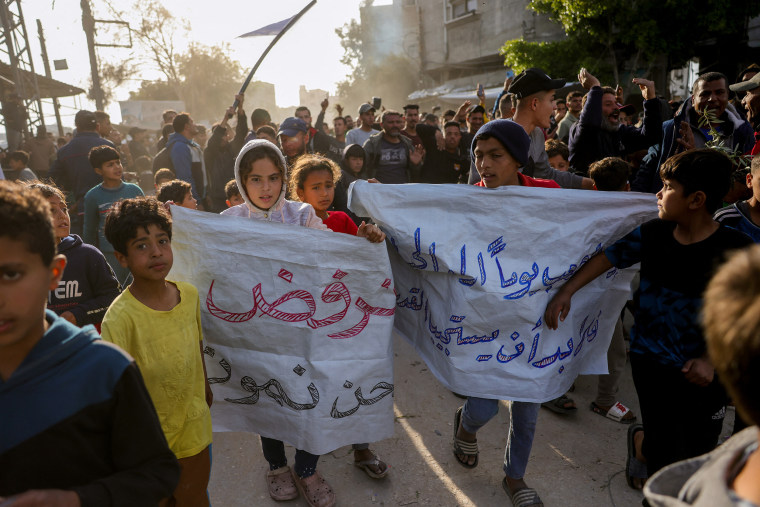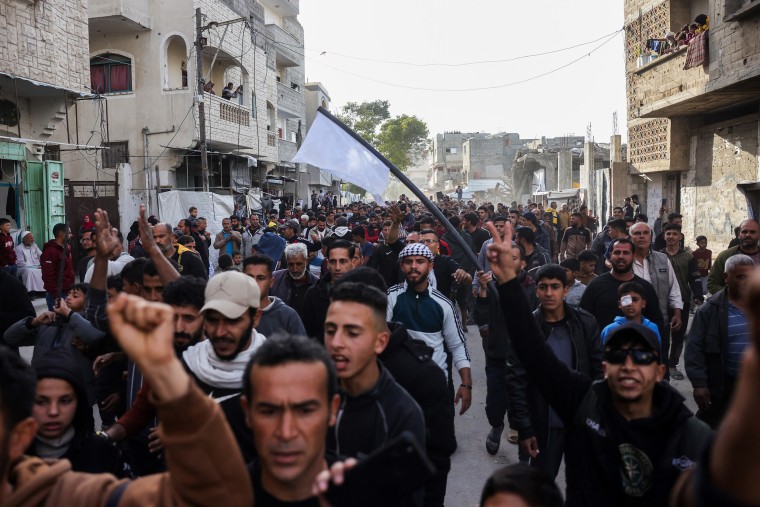In a rare show of dissent, anti-Hamas slogans were shouted by some protesters as hundreds of people gathered in northern Gaza to call for an end to the war.
Demonstrators could be seen calling for Hamas to go “outside” in a video verified by NBC News, which showed scores of people amassed in the city of Beit Lahia on Tuesday.
Most were calling for an end to the 17-month-long conflict and Israel's military offensive, which has seen more than 50,000 people killed in the Hamas-run enclave since Oct. 7, 2023, according to Palestinian health officials. Israel launched its offensive in the Gaza Strip after the Hamas-led Oct. 7, 2023 terrorist attacks, in which about 1,200 people were killed and 250 taken hostage, according to Israeli tallies.
“We don’t want destruction; we don’t want war; we want to live,” one man can be heard saying in another video shared on social media and verified by NBC News in the city of Beit Lahia in northern Gaza on Tuesday.
Children were also pictured carrying signs saying “We refuse to die” at the rally in the city, much of which has been reduced to rubble during the conflict.
Others in the crowd, which appeared to be mostly made up of men, shouted "Hamas out" and "Hamas terrorists," according to the Agence France-Presse news agency, which had at least one reporter on the scene.
It was not immediately clear who organized the protest, but NBC News' crew on the ground reported plans were circulating for further demonstrations Wednesday. Hamas did not immediately respond to a request for comment.

“I think the protests are coming really at an important time where Hamas is really being pushed from all sides — the Israeli government, the U.S. government, Palestinians writ large,” Sanam Vakil, director of Chatham House’s Middle East and North Africa Programme, said in a phone interview Wednesday.
“The protest really signifies that there is indeed frustration, if not opposition, to Hamas,” she added.
While there have been small protests calling for an end to the war in Gaza, Tuesday’s demonstration appeared to be the biggest since the start of the current conflict.
Israel has routinely called for Palestinians to mobilize against Hamas and has maintained a land, air and sea blockade on the enclave since Hamas took power in 2007 following Israel’s withdrawal from the territory after 38 years of occupation.
But levels of discontent are hard to gauge. A poll released in September by the Palestinian Center for Policy and Survey Research, a think tank based in the occupied West Bank, found support for Hamas in the Gaza Strip to be at 35%, compared to 38% three months before.

Israel resumed airstrikes and ground operations in Gaza after the first phase of a 42-day ceasefire deal with Hamas ended March 1. Since then, more than 700 people have been killed in the enclave.
Negotiations on the second stage of the truce deal were meant to begin 16 days after the start of stage one — but this did not happen.
As a result, dozens of hostages, both alive and dead, remain in Hamas’ captivity as efforts by mediators to resume the truce and see them released remain in limbo.
Israel has pushed for Hamas to agree to a proposal pitched by Steve Witkoff, President Donald Trump's special envoy to the Middle East, which would have seen an extension to the first phase of the deal.
Hamas has demanded a return to negotiations aimed at implementing the second part of the three-phase deal, which was expected to pave the way to an end to the war.
The militant group has previously signaled that it would be willing to cede political power and administrative governance of Gaza to a Palestinian unity government but maintained it would not disarm until an internationally recognized independent Palestinian state is realized.
Hamas leaders are likely to feel “very much backed into a corner” and “can’t figure out a way to achieve all of their aims, which are of course to remain a political force in Gaza, obtain a pathway for Palestinian statehood and of course, end the war,” Vakil said.
Eventually, she added, “they’re likely going to have to compromise … but systems like Hamas’ don’t generally put the needs of their citizens before their own.”
